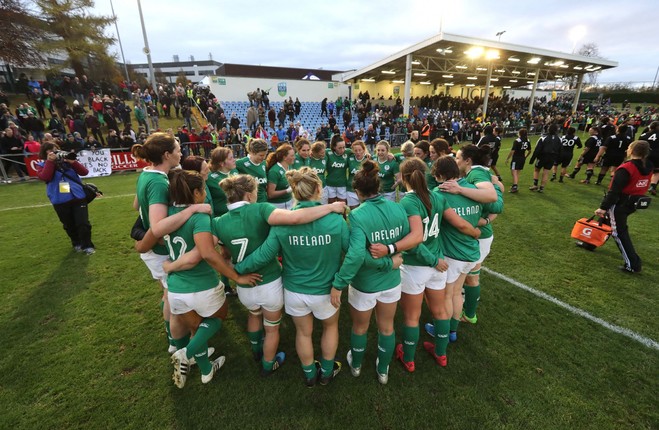WEDNESDAY OF LAST week in a Dublin hotel and it’s the business end of the Philips Sports Manager of the Year Awards lunch. The gathered worthies of Irish sport have just polished off their desserts when Minister of Sport Patrick O’Donovan is ushered onto the stage.
“I’m sorry I’m late,” says O’Donovan, boyish, rosy-cheeked and nervous. “I’ve been detained at Leinster House. This thing called New Politics!”
A polite laugh.
“Christ, they’ve sent the work experience kid,” someone mutters.
***
O’Donovan might have looked out on the almost totally male audience for his speech and concluded he was on the right track with his plan to shake things up a bit in Irish sport. He certainly would have empathised with outsiders forced to prove themselves to bunches of sceptical blokes in suits.
On Monday, soon after he announced his proposal to link state funding to a minimum presence of women on the boards of sports bodies, came the usual objection to quotas: Shouldn’t positions be filled by the best person for the job?
“It should be a natural process,” Dublin GAA County Board chairman Seán Shanley told the Irish Independent. “As they say, the cream will come to the top.”
Of course, O’Donovan’s first gig as a minister was to bear witness to this summer’s Olympics, that triumph of Irish sporting administration, when, among other calamities, the Irish Olympic movement’s best person for the job found himself unavoidably detained by the Rio constabulary. No wonder he might have had his doubts about the cream coming to the top.
Questions were also asked about whether this was the right medicine for the ailment. Will young girls be inspired to take up and continue playing sport in greater numbers just because they share a gender with 30% of the ruling classes?
I think back: was my own childish love of sport inspired by stellar figures of Irish sports administration? Did I have posters of Liam Mulvihill on the bedroom wall? Or Syd Millar? Or Peadar ‘Big Dinner’ O’Driscoll of the FAI?
But the general tone of those who welcomed O’Donovan’s plan was that this was a nudge in the right direction. Quotas work. They are like vaccines: they introduce a small dose of something unpleasant, in this case unfairness, to inoculate the system against a greater disease.
If you were being hard on O’Donovan you’d label this a classic piece of neoliberal trickle-down policy, legislating from the top down rather than the bottom up. Wouldn’t he be better off throwing some cash at coaching and facilities, and figuring out why there is a huge drop off in female participation after the age of 16?
But given that gender equality is at its strongest in Olympic sports – where those running them know the value of a medal is the same for men and women – then forcing structural changes at the top level in other sports is a pretty sensible idea.
Things have definitely improved in the big team sports from less than two decades ago when women were virtually invisible. At least now most people can name Irish women rugby, soccer and Gaelic players. But as the male wings of the major sports continue to dominate public attention, genuine equality still seems well out of reach.
The fact is that women’s sport has come a long way, but it still has about a century to go.
Remember that most of the major sports were organised and codified by Victorian schoolmasters, puritanical figures with the key aims of preparing boys for war and stopping them from playing with themselves.
These sports became popular with male industrial and agricultural workers, enjoying the new-found phenomenon of leisure time. Women weren’t granted this luxury, as they were expected to run the household while their husbands blew off steam from the mills and mines.
Now, I’m no sociology PHD, but it’s fair to say things have happily moved on from this situation, and there are tectonic shifts in society of which the women in sport debate is only a part.
While sport remains frozen in its 19th century, male-dominated genesis, changes in how gender roles are defined have created pressure points where suddenly it’s no longer okay for a top women’s Gaelic football team to train in a muddy field and go home without a shower or a meal while the boys are lavished like Regency princelings.
When you are the father of daughters it’s a lot to be thinking about. You spend a lot of time wondering how best to raise them when what it means to be a girl is shifting even since you were a child yourself; and then you realise, that all you can do is try to make their lives a little freer, and fairer.
Even tectonic plates need a little shove now and then.
The42 is on Instagram! Tap the button below on your phone to follow us!

